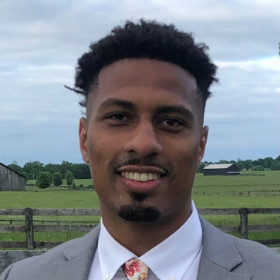Sport Identity and Jesus

Student-athletes, like all students, undergo extreme searches for identity development, which plays a role in the individual’s search for authenticity. As evidenced in the name “student-athlete,” they navigate multiple identity roles as they develop as young adults. Identity development closely aligns with how an individual uncovers a personalized sense of meaning and purpose in life. Meaning and purpose tend to focus outside of oneself, leading to examining spiritual beliefs and values. Student-athletes are only a single example of a subpopulation of college students whose spiritual development occurs differently than other students.
Few student-athletes navigate multiple identities and a myriad of additional challenges in their collegiate journey than African American student-athletes (AAFSAs). Studies continually demonstrate that African American student-athletes face many challenges, such as stereotyping, discrimination, being a first-generation college student, being a highly solicited scholarship athlete, and coming from a low socioeconomic environment. Moreover, some AAFSAs struggle to have a sense of belonging at the institution they attend, especially at predominantly white institutions (PWIs).
Ramsey states that “when student-athletes arrive on campus, they are often assigned a coordinator to assist with their academic achievement (academic coordinator), life skills development (social, emotional, mental coordinator) and athletic participation (defensive and offensive coordinator).” While athletes are assisted in developing as a student and an athlete, what is often overlooked in the assignment of “coordinators” is someone to assist them in spiritual development. Sport ministry organizations (SMOs), like Fellowship of Christian Athletes (FCA) at higher education institutions (HEIs), exist to support student-athletes in spiritual development, coping, relationship formation, and identity formation.
8 years ago, I was in that position: I was an African American student-athlete at The Ohio State University. I was privileged with the opportunity to wrestle my first year in college. It was quite the experience. It is hard to truly articulate what it means to be an athlete at the highest level of collegiate athletics. It was a constant battle to balance the stress of academics, competition, and trying to have a social life. But the most challenging battle of all was understanding identity. Being an athlete my whole life, it was important part of who I was. It wasn’t until I stepped away from wrestling that I had realized that I’d put my identity in being an athlete first. As I got involved in a sport ministry organization (Athletes in Action), the teachings, the reflections, and the spiritual growth helped me to realize that the most important identity I have is that in Christ. Through this first and foremost identity, that filters how I view everything else; how I am a student, how I am an athlete, how I am a friend, how I am a brother, etc. Through understand this principle, the rest of my collegiate journey transformed.
As I progressed throughout my education, I combined my two passions: faith and sport. In my first research project, I wanted to understand if student-athletes perceive their athletic identity differently through participating in FCA, and what role does FCA play in student-athletes spiritual development. In a qualitative study, athletes from a large Division I institution were interviewed. FCA contributed significantly to either participants continuing in spirituality faith or begin the journey of spirituality. FCA played a vital role in how student-athletes perceived their athletic identity. The participants realized that there was more than just how they perceive themselves or other perceive them as athletes. Participants indicated they could use the platform they have as student-athletes at the Institution, to point others to God. Relationships were significant as well, as every participant mentioned how FCA brought important, meaningful relationships. These relationships helped foster growth and provided incentives to attend weekly meetings.
In my current research, there is a three-fold an intersection of academic interests, personal experiences, and values. It is an expansion of the forementioned research. My dissertation research focuses on SEC African American football student-athlete’s (AAFSAs) perceptions of FCA, FCA’s role in their spiritual development, and how FCA influences coping. Utilizing the Faith Development Theory of Fowler and Parks, the researcher will understand how student-athletes manage the ongoing conflict between role identities and how spiritual development is facilitated through FCA. This research is following a survey research design. The intention is that quantitative methods will result in outcomes and data (numerical) that can be generalized across the student-athletes and FCA s as well as future situations with likened variables. Embedded within the survey are qualitative inquiries to acquire additional information from the participating SEC AAFSAs regarding their perceptions and experiences of FCA. The inquiries collected will produce rich data and facilitated a vaster understanding of participants’ experiences. The potential impact of this research is to:
- Contribute new knowledge to the field of spiritual development and student-athletes, especially African American student-athletes.
- Uncover the impact spiritual development has on the collegiate experience of student-athletes.
- Assist institutions in understanding the best way to provide supportive services and resources to encourage spiritual development in African American Football student-athletes.
- Provide an evaluative tool for FCA to understand what they are currently doing well and further engage and cultivate spiritual development in student-athletes at institutions.
Personally, my hope for research is to always lead to practical applications for those involved. For the Institution. For the Sport Ministry Organization. For the student-athlete.
While athletes are assisted in developing as a student and an athlete, what is often overlooked in the assignment of “coordinators” is someone to assist them in spiritual development.
— RASHEED FLOWERS
Listen to the companion podcast.



